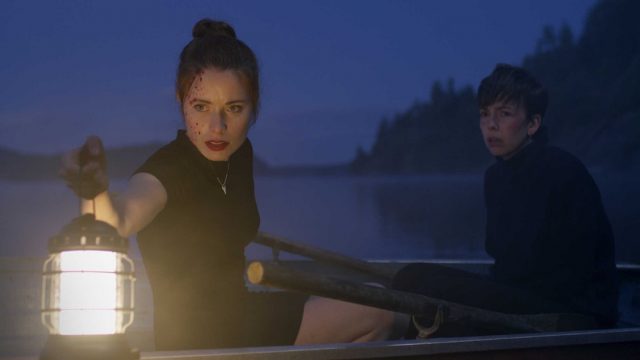What Keeps You Alive is half-great. I almost want to propose it as a writing exercise, presenting its excellent, suspenseful setup and asking what people think happens next.
[The following review will contain spoilers for the first half of What Keeps You Alive.]Directed by Colin Minihan, What Keeps You Alive is a horror-thriller that–strangely, considering Minihan’s past directing credits are solidly in the horror genre–succeeds best when it confines itself to being a haunting, agonizingly tense marital thriller in the vein of Gone Girl.
The film stars Jules (Brittany Allen) and Jackie (Hannah Emily Anderson) as a married couple celebrating their one-year anniversary at a rustic-yet-luxurious cabin in the woods. Despite the obviously ill-advised choice in a horror movie to go anywhere near trees, the house is entirely convincing as a romantic destination. This isn’t yet a story about characters who make bad decisions. It is, possibly, one about happiness that’s too good to be true.
Jules and Jackie’s first night in the cabin seems to be going smoothly. Jackie is acting a little strangely, reminiscing at length about her first experience killing a bear and singing an extremely ominous song, but it seems like nothing more than nostalgia and melancholy; it’s nothing, at any rate, that Jules can’t distract herself from with rose-colored glasses. But then there’s a knock at the door: Sarah, a neighbor from across the lake, saw their lights on and, unused to the house being occupied, wanted to make sure everything was okay. Sarah is startled to see Jackie there–the two grew up close from all their summers by the lake–but quickly excuses herself.
Before she does, though, she calls Jackie “Megan.”
This is the first turn of the screw, with more to come. Here’s one more: “Megan” and Sarah had another friend growing up, a girl named Jenny who died under suspicious circumstances. Jackie offers explanations for both, and Jules must decide if those stories are true, plausible, or even possible. She wants, certainly, to believe her wife, to believe in her wife, whom she clearly adores. And just as the viewer is preparing for a movie of sustained emotional cat-and-mouse, What Keeps You Alive escalates beautifully in a no-going-back move:
In a single rush of movement, Jackie pushes Jules off a cliff. She goes back to the house and rehearses her 911 call before going to sit by the body–only to find that the body is not there. Jules, bloodied and broken, survived her fall and is now hiding in the woods, terrified and confused. This is all perfect. Less than an hour into the film, we’ve hit a crisis point where these two people’s lives have changed forever, with no reliable indication of what’s going to come next, with no certainty as to Jackie’s motivations.
Unfortunately, the film can’t live up to its beginning. Its late middle can’t even live up to the minutes before that–after the movie settles down into a more conventional pattern and begins providing conventional explanations, Minihan still finds little ways of escalating the tension and horror, introducing new complications and problems… and then the characters realize they’re in a horror movie and begin acting according to the rules of their genre above all else. It forces stupidity upon them in a way that further twists simply can’t compensate for.
But everything up to Jules’s vanished body is superb. In On Writing, Stephen King provided the first half of a short story and invited readers to, as an exercise, write the ending themselves; a roomful of monkeys couldn’t have made a better ending for What Keeps You Alive, but, sadly, any randomly selected roomful of screenwriters could have made exactly this ending. A little more work and ingenuity could have made this a masterpiece.

